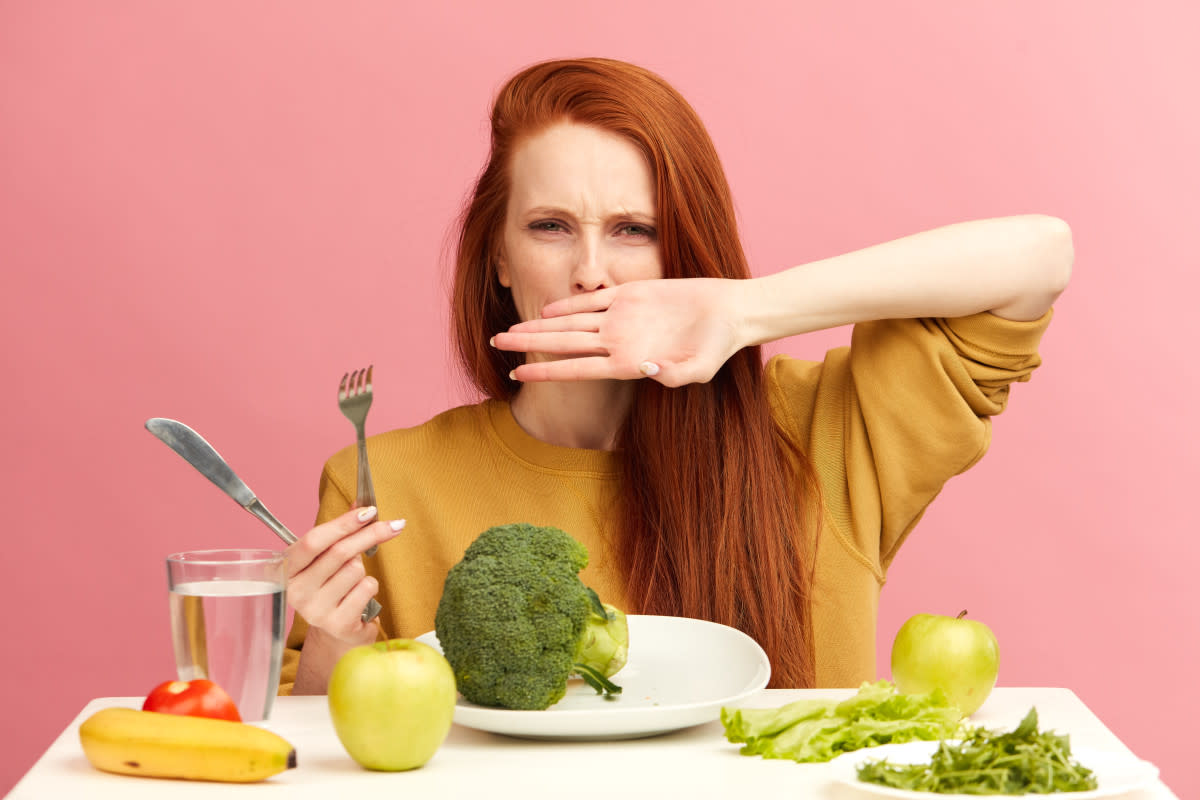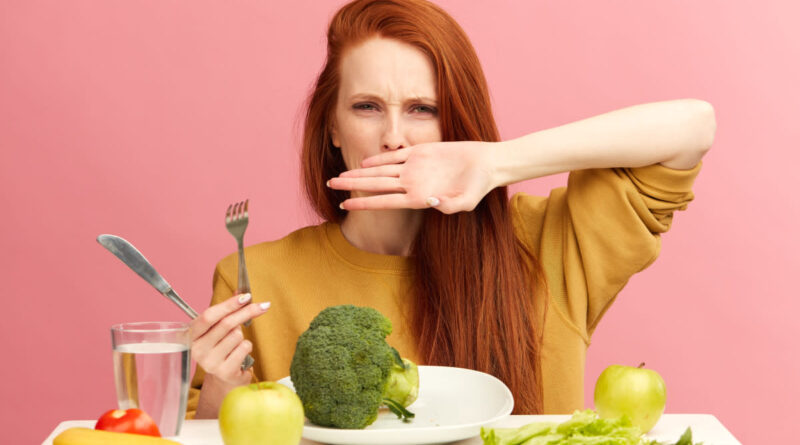7 Things That Happen to Your Body When You Don’t Eat Enough Vegetables

The woman closed her mouth as she looked at the plate of vegetables.
“Eat your veggies” may have been a common command at the dinner table when you were growing up. It may not stick. Maybe you don’t like veggies, or your on-the-go lifestyle makes the drive-thru a convenient option. Maybe you enjoyed doing something different from what your parents told you to do (and still do as an adult). You may have asked your parents, “Not eating enough fruits and vegetables will cause what, exactly?”
Maybe you’re not alone. Another recent CDC report published in 2017 showed that only 9.3% of US adults ate enough vegetables in 2015. Fruit fared only slightly better, with 12.2% of adults meeting and daily suggestions. Health organizations like the American Heart Association suggest getting 4 to 5 servings of fruits and vegetables every day if you’re following a 2,000-calorie-per-day diet.
“Vegetables are a powerful source of health,” it says Kalyn True, RD, registered dietitian with Memorial Hermann. “They are full of important nutrients such as vitamins, minerals and fiber.”
Combined, these essential nutrients are very beneficial to the body. So what happens if you don’t eat vegetables or don’t stop following the daily recommendations? Registered dietitians ate and gave advice on how to increase your intake of these powerful foods (and their siblings, fruits).
Related: Here’s Exactly What Happens to Your Body When You Drink Decaf Coffee Every Day, According to Nutritionists
What Happens If You Don’t Eat Vegetables
1. Fiber intake is reduced
Many people do not eat enough vegetables. A study published in 2017 showed data suggesting that only 5% of Americans meet daily fiber recommendations. By chance?
Probably not—at least not in some cases. “Skipping vegetables means you’re missing out on nutrients, including fiber,” she explains. Cara Harbstreet, MS, RD, LD of Street Smart Nutrition. “This adds up, and eating low fiber regularly can affect gut health or overall health. “
You may find yourself with regular (rather than permanent) support. “The lack of vegetables in a person’s diet causes a lack of fiber, which causes irregular bowel movements and intestinal pressure,” it says. Daniel Chavez, RD, of Fay.
2. The risk of illness increases
Veggies can help you feel healthier and live your healthiest, longest life. “Not eating enough fruits and vegetables on a regular basis can increase the risk of many health conditions, including cancer, heart disease, diabetes, high blood pressure and stroke,” he says. Jennifer Hernandez, RD, of Plant-Enhanced Kidneys.
And in general, not getting enough vegetables weakens the immune system.
“Without a steady supply of vitamins and antioxidants from vegetables, the immune system can struggle to fight off the sniffles,” True says.
3. You will probably have less energy.
Are you trying to identify a powerful vampire? Think about your veggie diet. “Vegetables fire up your body’s engine,” True says. “They provide important vitamins and minerals that help turn food into energy. If you keep skipping vegetables, people may feel tired and sluggish throughout the day, making it difficult to concentrate or continue with your daily activities.”
4. You may be more thirsty
Yes, food can help you quench your thirst. The idea that all your water needs to come from 8 glasses of water a day? A complete myth.
“With their high water content, vegetables contribute to our overall daily intake,” says Harbstreet. “You can certainly get all the fluids you need from water and other drinks, but providing vegetables to ‘read’ helps you stay well hydrated. ‘get from food sources.’
5. Skin problems may occur
Getting solid skin care from the “inside-in” has at least one RD stamp of approval. “Vegetables contain nutrients like vitamin A and antioxidants that promote healthy skin,” Chavez says. “Without enough greens, dull, dry skin, acne, premature aging and other skin problems may appear.”
Hernandez adds that nutritious vegetables also help in wound healing.
6. You may gain weight
The number on the scale is not the be-all, end-all of health or nutrition. However, not eating enough vegetables can cause weight gain. “Not eating enough fruits and vegetables can lead to unintentional weight gain as we fill up on high-calorie foods,” Hernandez says.
2018 review published on Energy showed “moderate quality evidence” between veggie consumption and weight gain. The researchers also noted that there is no apparent risk of eating veggies, so encouraging people to eat more for weight loss and maintenance is not a bad idea.
7. Nothing
Are you surprised? “If you eat a lot of fruit and get your nutrients from other sources, skipping vegetables may not make a noticeable difference for you,” Harbstreet says. As surprising as it may sound coming from a nutritionist, you may be getting enough nutrition from other foods. “
That doesn’t mean you should give up vegetables. “In my experience, that’s not the case for most people,” says Harbstreet. “Although it’s possible, it’s not impossible, so just to be on the safe side, don’t eliminate them from your diet altogether.”
Related: A Simple Measure You Can Use to Calculate Your Heart Disease Risk, According to Cardiologists
What Happens If You Don’t Eat Fruit?
In fact, the same thing happens if you don’t eat enough vegetables. Different fruits and vegetables have different nutrients—hence, the idea of ”eating the rainbow”—and benefits.
“Similar to the lack of eating vegetables, there may be consequences of not eating enough fruit regularly,” Chavez says. “Like veggies, fruits are high in essential vitamins, minerals and antioxidants.”
These supplements can help with:
Related: These Are the 20 Healthiest Vegetables of All Time, According to Registered Dietitians
How to love eating Veggies
Having trouble getting all your veggies in? Here are some tips for getting more vegetables—and loving them.
1. Slice and dice
Enjoy the way you serve vegetables. “Yes, the same trick that works for young children can work for adults as well,” Harbstreet says. Shred or cut green vegetables into new shapes or use something like a crinkle cutter to add flavor and texture. Anything that draws you in or catches your interest is a good thing and doesn’t require much more effort than slicing and cutting. do whatever it takes.”
2. Try different cooking methods
Roasted or boiled vegetables do the job quickly. However, think about having fun and experimenting in the kitchen.
“Stirring, grilling or broiling to create different flavors and textures can also encourage a eater to eat them,” says Chavez.
3. Find the colors
This one cannot go without saying. “Incorporate different colors into food,” says Chavez. “Bright and bright colors can be attractive and inviting.”
Think red, green and yellow peppers in a salad for lunch and carrots and cauliflower next to salmon for dinner.
4. Be crafty
Another parent-optimized hack that works with adults, too.
“Try adding roasted zucchini to your muffins, roasted cauliflower to yours, or fresh spinach to your pasta sauce,” True says. “They add moisture and nutrients without overpowering the flavor.”
Hernandez shared another thought. “Put vegetables in sandwiches,” he said. “It’s a great way to add texture and flavor to a sandwich. Try thinly sliced radishes for a spicy kick.”
5. Record it
Not the taste? Stuffing food into a high-fat dressing can lead to overeating, but that doesn’t mean your vegetables need to be boring.
“Use herbs [and] “Experiment with different ingredients to find what appeals most to a vegetarian,” says Chavez.
Next: Here’s Exactly What Happens to Your Body When You Drink Decaf Coffee Every Day
Sources
-
Kalyn True, RD, registered dietitian with Memorial Hermann
-
Variation in Fruit and Vegetable Consumption of Adults by State – United States, 2015. CDC.
-
Fruits and Vegetables Serving Sizes Infographic. American Heart Association.
-
Closing America’s Fiber Intake Gap: Discussion Patterns from the Food and Fiber Conference. American Journal of Lifestyle Medicine.
-
Cara Harbstreet, MS, RD, LD of Street Smart Nutrition.
-
Daniel Chavez, RD, of Fay
-
Jennifer Hernandez, RD, of Plant-Enhanced Kidneys
-
The relationship between vegetable intake and weight outcomes: A systematic review of cohort studies. Energy
#Happen #Body #Dont #Eat #Vegetables
